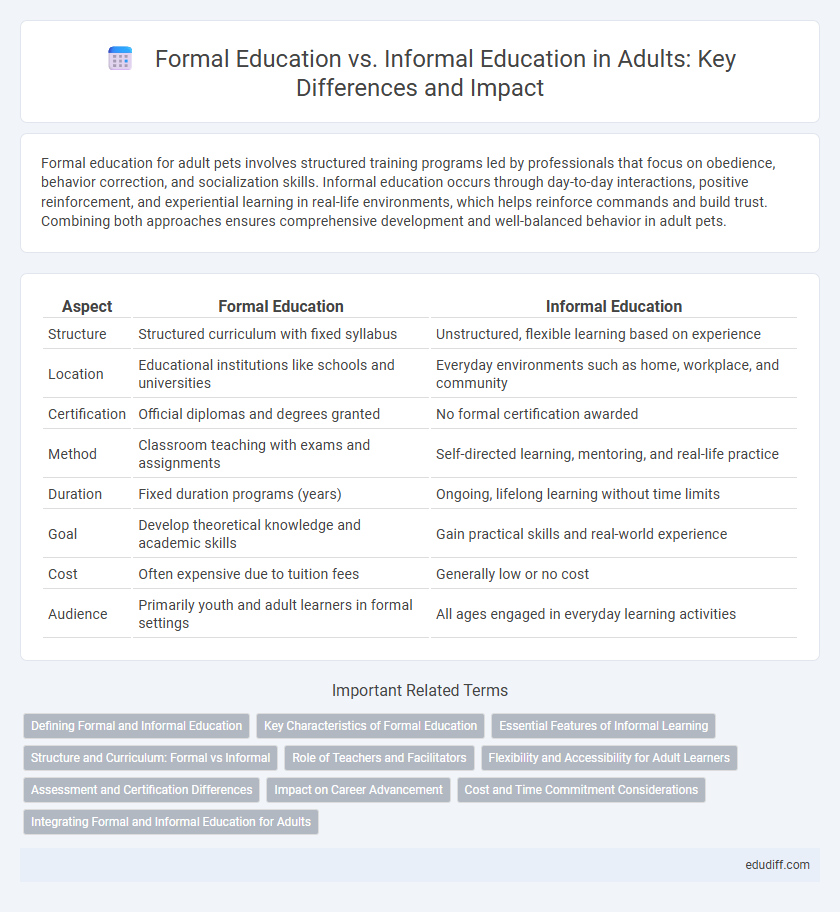Formal education for adult pets involves structured training programs led by professionals that focus on obedience, behavior correction, and socialization skills. Informal education occurs through day-to-day interactions, positive reinforcement, and experiential learning in real-life environments, which helps reinforce commands and build trust. Combining both approaches ensures comprehensive development and well-balanced behavior in adult pets.
Table of Comparison
| Aspect | Formal Education | Informal Education |
|---|---|---|
| Structure | Structured curriculum with fixed syllabus | Unstructured, flexible learning based on experience |
| Location | Educational institutions like schools and universities | Everyday environments such as home, workplace, and community |
| Certification | Official diplomas and degrees granted | No formal certification awarded |
| Method | Classroom teaching with exams and assignments | Self-directed learning, mentoring, and real-life practice |
| Duration | Fixed duration programs (years) | Ongoing, lifelong learning without time limits |
| Goal | Develop theoretical knowledge and academic skills | Gain practical skills and real-world experience |
| Cost | Often expensive due to tuition fees | Generally low or no cost |
| Audience | Primarily youth and adult learners in formal settings | All ages engaged in everyday learning activities |
Defining Formal and Informal Education
Formal education refers to structured learning that occurs in institutional settings such as schools, colleges, and universities, following a specific curriculum and leading to recognized certifications or degrees. Informal education involves unstructured, experiential learning outside traditional classrooms, including self-directed study, life experiences, and social interactions that enhance knowledge and skills. Both types of education contribute significantly to adult development, with formal education providing foundational theory and informal education fostering practical application.
Key Characteristics of Formal Education
Formal education is characterized by a structured curriculum, scheduled classes, and certified instructors within accredited institutions, ensuring standardized learning outcomes. It emphasizes curriculum-based knowledge acquisition, assessments, and qualifications such as diplomas or degrees recognized by educational authorities. The systematic approach facilitates measurable skill development and progression through defined educational stages.
Essential Features of Informal Learning
Informal learning is characterized by its self-directed, experience-based nature, occurring outside structured educational settings and driven by personal interests and real-life activities. It emphasizes flexibility, social interaction, and immediate application, fostering skills and knowledge through observation, practice, and collaboration. Unlike formal education, informal learning lacks standardized curricula and assessments but contributes significantly to lifelong learning and skill development.
Structure and Curriculum: Formal vs Informal
Formal education features a structured curriculum with standardized syllabi and assessment methods designed by educational authorities, ensuring consistent learning outcomes. Informal education lacks a fixed curriculum, relying on experiential learning, individual interests, and practical experiences that adapt to learners' needs. This flexibility contrasts sharply with the rigid frameworks of formal systems, allowing for personalized and context-driven knowledge acquisition.
Role of Teachers and Facilitators
Teachers in formal education deliver structured curricula and assess student progress through standardized methods, ensuring foundational knowledge and skills. Facilitators in informal education guide experiential learning and encourage critical thinking by creating interactive, learner-centered environments. The complementary roles of teachers and facilitators enhance adult education by combining discipline with flexibility to accommodate diverse learning needs.
Flexibility and Accessibility for Adult Learners
Formal education often involves structured schedules and fixed locations, limiting flexibility for adult learners balancing work and family commitments. Informal education offers greater accessibility through self-paced online courses, community workshops, and practical experiences that accommodate diverse learning styles and time constraints. This flexibility enables adults to tailor their learning paths without sacrificing personal or professional responsibilities.
Assessment and Certification Differences
Formal education typically involves standardized assessment methods such as exams, quizzes, and graded assignments, resulting in official certifications like diplomas or degrees recognized by academic institutions and employers. Informal education relies on self-assessment, peer feedback, and practical application without standardized tests, often leading to skills development without formal certification. The lack of universally recognized credentials in informal education can pose challenges for validation in professional settings compared to the structured certification systems in formal education.
Impact on Career Advancement
Formal education provides structured learning, recognized certifications, and industry-specific knowledge essential for career advancement in regulated professions like law, medicine, and engineering. Informal education, through self-directed learning, mentorship, and practical experiences, fosters adaptability, creativity, and real-world problem-solving skills highly valued in dynamic industries such as technology and entrepreneurship. Combining formal credentials with continuous informal learning enhances professional growth, improves employability, and accelerates career progression in competitive job markets.
Cost and Time Commitment Considerations
Formal education often requires significant financial investment and long-term time commitment, including tuition fees, textbooks, and structured schedules. Informal education provides flexible, cost-effective learning opportunities that adapt to individual pace and availability, minimizing lost income or extended absences from work. Balancing cost-efficiency and time management is critical for adults seeking to enhance skills without disrupting professional or personal responsibilities.
Integrating Formal and Informal Education for Adults
Integrating formal and informal education for adults enhances lifelong learning by combining structured curricula with experiential knowledge gained outside the classroom. This approach leverages certified training programs alongside community-based workshops, online tutorials, and peer collaboration to build practical skills and adaptability. Effective integration aligns adult learners' personal goals with academic standards, promoting continuous skill development and improved employability.
Formal education vs Informal education Infographic

 edudiff.com
edudiff.com